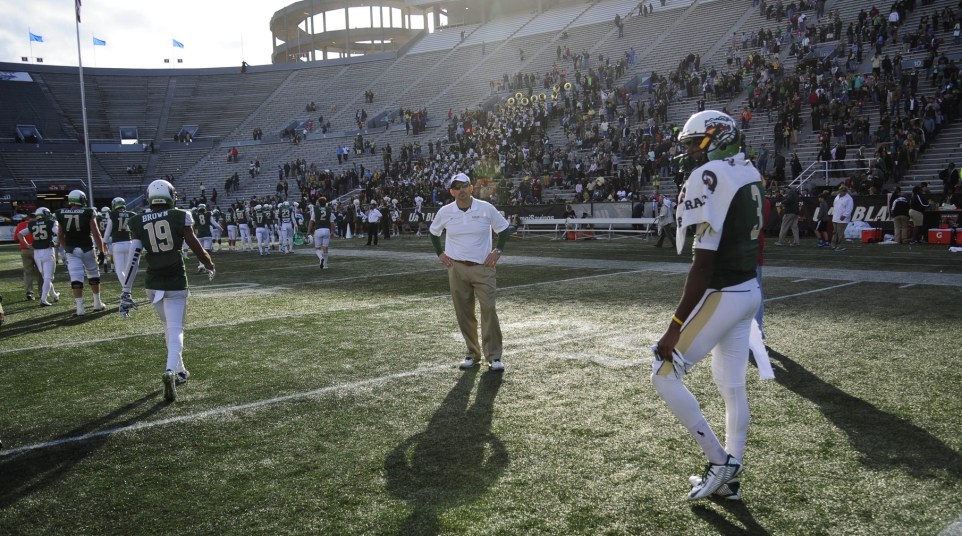
Did Paul Bryant Jr. really kill football at UAB?
When the University of Alabama-Birmingham shut down its football program after 2014, the reaction was one of universal surprise.
Surprise to the players, who had finished with a 6-6 record, UAB’s best season in a decade.
Surprise to the administration, who had not expected the groundswell of support the Blazers’ football program suddenly received once it was announced it would be dissolved.
Surprise to the fans, who had averaged a not great but still solvent 21,800 attendance figure per game at Legion Field that season, more than double the Blazers’ draw in 2013.
People started looking for scapegoats. They found one in Paul Bryant Jr., the son of the legendary Alabama head coach Paul “Bear” Bryant.
Bryant was held accountable for the demise of UAB football because of a letter Gene Bartow, the founder of the Blazers’ athletic program and former men’s basketball coach, wrote in 1991 to David Berst, the NCAA assistant executive director for enforcement, urging the NCAA to investigate the Alabama basketball program.
Furthermore, Bartow mentioned in the letter that former Alabama assistants Danny Ford, Jackie Sherrill and Charlie Pell, all of whom were sanctioned by the NCAA after they became head coaches, were “trained” by Bear Bryant.
Bartow apologized soon afterwards, referring to Bryant Sr. as “the greatest football coach who ever lived” in the process.
Still, Bryant Jr. was said to be livid. Since Bryant Jr. rarely grants the media access, something that could’ve helped refute the rumors, a belief rose that he was determined to gain his revenge by shutting down UAB football.
When last asked about UAB football in 2015, Bryant Jr. denied comment. But the allegation is Bryant, who sits on the Alabama Board of Trustees, was instrumental in killing the program after Bartow died in 2012.
Here are the two primary allegations against Bryant:
The board refused to give UAB permission to hire Jimbo Fisher as head coach in 2006.
Which is true. Some theorize Bryant wanted Fisher, then LSU’s offensive coordinator, to be available for the Crimson Tide, which was also looking for a coach before eventually hiring Nick Saban.
Instead, UAB hired Neil Callaway, who was then Georgia’s offensive coordinator and was a former Alabama lineman in the ’70s.
The problem with this theory is Fisher, now Florida State’s head coach, never coached at Alabama. If influential on the hire, Bryant Jr. just as easily could have wanted Callaway to have the UAB job out of loyalty to his playing and later coaching career at Alabama, where he was an assistant under Mike DuBose.
After all, Georgia had enjoyed resurgence with two SEC championships in Callaway’s six seasons there under head coach Mark Richt, and Callaway was named the Crimson Tide football team’s “Most Outstanding Athlete” in 1977. Today, Callaway is the offensive line coach at Southern California.
In hindsight, Callaway’s hire as UAB head coach was a poor one as he posted an 18-42 record. But at their respective ages, the potential for longevity at UAB if Callaway was successful was greater than a potential Fisher hire.
And why would Bryant Jr. want one of his father’s former players to be put into a position to fail, anyway?
The board blocked a proposal to fund an on-campus football field at UAB.
Legion Field is hardly a modern football stadium, and UAB will likely play in front of 50,000 empty seats for many home games.
On the other hand, Legion Field is a historic venue and, aside from UAB, the Birmingham Bowl is its only major tenant. Approving a new stadium for the Blazers could mean the end of Legion Field.
Does one really expect Bryant Jr. to sign off on such a thing?
True, Tulane has experienced an attendance rise since moving to on-campus Yulman Stadium, going from an average of 19,747 fans in their last season in the Superdome in 2013 to 25,012 in 2014 and 22,930 in 2015 despite regressing on the field.
But the Green Wave aren’t going to be hosting Louisiana State at a 30,000-seat venue, either.
By not speaking to the press and with much criticism written about his business career, Bryant Jr. is not a sympathetic figure.
But one has to ask, if he wanted to get back at Bartow, why did he wait 23 years after the letter was written? If it had something to do with Bartow’s death, why not act after the 2013 season following nine straight losing seasons and an attendance mark that by NCAA rules would have gotten them kicked out of the FBS if maintained?
Why not act before a new football coach, Bill Clark, was hired and led the team to a bounceback 6-6 season? How did UAB football grow from Division III status in 1991 to I-AA in 1994, I-A in 1996 and Conference USA in 1999 if Bryant held the Sword of Damocles over it? Why not go after Bartow’s baby, the basketball program?
The good news is UAB football will kick off again next year. The decision to drop the program seemed shortsighted (the Blazers program actually made a small profit in 2014), it would’ve eventually gotten UAB kicked out of Conference USA, and it was reportedly based on dubious reports from a consulting firm.
And they didn’t have to go over Bryant’s dead body to restore the program.
